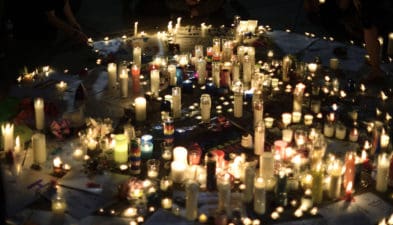The mass shooting at the Route 91 Harvest Festival in Las Vegas was a devastating tragedy. Amidst the debates about gun control, terrorism, and the shooter’s motive, there is another unresolved issue:
Workplace safet
In addition to dozens of bands and musical acts, the three-day country music concert was staffed by hundreds of employees: Live Nation organizers, event producers, production crew, instrument technicians, hair and makeup artists, ticket takers, merchandise vendors, security guards, bartenders and more.
In the crowd, there were people working, too: music reviewers and journalists (including one from Rolling Stone), photographers, marketers and PR people.
This isn’t the first time media and entertainment workers have been affected by mass violence in a performance venue. In the past few years, we’ve seen attacks at Pulse nightclub in Orlando, the Ariana Grande concert in Manchester, and a sports stadium and concert hall in Paris on November 15, 2015.
Violence can happen in any workplace. According to OSHA, employees at particularly increased risk include healthcare and social service workers, retail workers, mail carriers and taxi drivers. But, they warn, “Workplace violence can strike anywhere, and no one is immune.”
Major sports and entertainment venues are doing more than ever to stay safe. It’s commonplace to have metal detectors, advanced surveillance systems, on-site police and security teams, and restrictions on the type and amount of items patrons can bring inside.
Yet, violence can still occur. In the case of the Las Vegas attack, the gunman never set foot on the festival grounds. He was able to shoot from his hotel window across the street—a scenario that concert organizers could have hardly anticipated.
How do media and entertainment employers protect their staff—at festivals, concerts, conferences, or any other large-scale event?
After the Manchester bombing, the UK’s Event Safety Alliance board member Tim Roberts released a document with counter-terrorism advice for concert crews. In the event of an attack, he suggests:
“There is bound to be an element of chaos following any attack, people in the immediate vicinity will respond on reflex and the need for self-preservation. However, as soon as possible, we need to start taking control to protect life and safety.
This means:
- Establish a mechanism for Show-Stop (which should be part of your plan anyway for other types of incident)
- Do what you can to support the venue with emergency messaging
- Get to your place of safety
- Await and respond to specific instruction from the police or the venue.”
In an interview with Billboard magazine shortly after the Pulse nightclub shooting, public assembly safety and security consultant Russ Simons suggested an increased focus on employee training. “Everybody needs appropriate training, but more importantly, you can’t train them once and forget about it,” he told Billboard.
“The key is to train people right, then observe them and assess their performance… That is where we fail more often than not. In my professional opinion, we don’t do we should do in making sure we are training and supporting our supervisors who are responsible for our line staff delivering consistent performance.”
Chris Robinette, CEO of Prevent Advisors, told Variety magazine that employers need to ask themselves: “‘Is our staff prepared and trained for an active shooter? How do we evacuate? How do we provide immediate care? And have we rehearsed this with local law enforcement?’ No one is suggesting you can reduce these risks to zero, because you can’t. But you can mitigate them to the highest degree possible.”
Does your team know what to do in case of a violent attack? What training do you provide in advance of large-scale workplace events such as festivals, concerts, conferences, panels or galas?
Topics:
Best Practices





